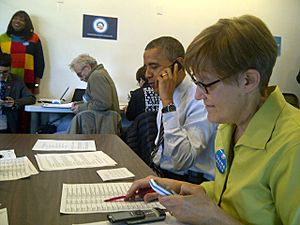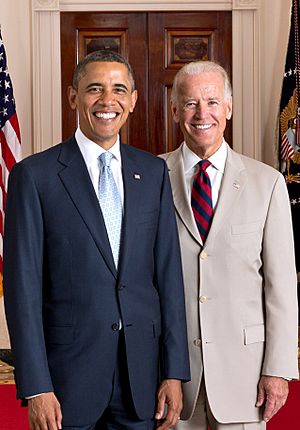Barack Obama 2012 presidential campaign facts for kids
Quick facts for kids Obama for America |
|
|---|---|
 2012 Obama–Biden campaign logo |
|
| Campaign | 2012 Democratic primaries 2012 US presidential election |
| Candidate | Barack Obama 44th President of the United States (2009–2017) Joe Biden 47th Vice President of the United States (2009–2017) |
| Affiliation | Democratic Party |
| Status | Announced: April 4, 2011 Presumptive nominee: April 3, 2012 Official nominee: September 5, 2012 Won election: November 6, 2012 Inaugurated: January 20, 2013 |
| Headquarters | 130 East Randolph Street Chicago, IL 60601 |
| Key people | Jim Messina (campaign chairman) David Axelrod (senior strategist) Harper Reed (chief technology officer) Michael Slaby (chief integration and innovation officer) Stephanie Cutter (deputy campaign manager) Brent Colburn (communications director) Matthew Barzun (finance chairman) Ben LaBolt (national press secretary) Rufus Gifford (finance director) |
| Receipts | US$738,503,770 (2012-12-31) |
| Slogan |  |
On April 4, 2011, Barack Obama, the 44th President of the United States, announced he would run for re-election. He became the official candidate for the Democratic Party on September 5, 2012. His running mate was Vice President Joe Biden. They ran against former Massachusetts Governor Mitt Romney and other candidates. The election happened on Tuesday, November 6, 2012.
Obama's campaign office was in Chicago. Key people from his successful 2008 campaign, like Jim Messina and David Axelrod, helped again. When he announced his run, the campaign released a video. It showed supporters getting ready for the re-election effort. This was the first US presidential re-election campaign to use Facebook and Twitter for promotion.
Between early 2011 and June 30, 2012, Obama's campaign spent about $400 million. This was reported by the Federal Election Commission. Obama won his re-election with 51.06% of the votes. This was more than Romney's 47.21%. It was the first time since 1944 that a Democratic president won with over 51% of the popular vote twice.
Contents
Obama's 2012 Re-election Campaign
Starting the Campaign
Barack Obama became the 44th President of the United States on January 20, 2009. On April 4, 2011, he officially announced he was running for re-election. He made this announcement with an online video called "It Begins With Us." He also filed the necessary forms with the FEC.
President Obama did not face many challenges in the Democratic primaries. He was on the ballot in almost all states. On April 3, 2012, Obama won the Maryland and District of Columbia primaries. This gave him enough delegates to secure the nomination. On April 30, 2012, the campaign announced its slogan: "Forward."
The campaign headquarters was in Chicago, not Washington, D.C.. Most other presidents running for re-election have their offices in Washington. The choice to be outside Washington was made to get more support from regular people.
Raising Money for the Campaign
The campaign started taking online donations on April 4, 2011. In the first 24 hours, over 23,000 small donations were made. President Obama held his first fundraiser in April 2011 in Chicago. He also held events in San Francisco, Los Angeles, and New York. On April 29, 2011, Matthew Barzun was named the finance chairman. Some people thought this campaign might be the first to raise over one billion dollars.
In the second fundraising period of 2011, the campaign raised a record $86 million. By May 3, 2012, Obama and his team had held 130 fundraisers. More than 550,000 people donated to the campaign in the second quarter of 2011. This was much more than the 180,000 donors in 2008. By the end of 2011, over 1.3 million people had donated. The LGBT community gave a lot of money to the campaign.
On May 10, 2012, Obama went to a fundraiser at actor George Clooney's home in Los Angeles. This event raised over $15 million. It was expected to raise about $10 million. But after Obama said he supported same-sex marriage, the amount went up a lot. Many believed the LGBT community would donate more after his announcement.
Using Technology for the Campaign
The Obama 2012 campaign invested a lot in technology. This was led by Chief Technology Officer (CTO) Harper Reed. Reed built a team of developers from top tech companies. These included Twitter, Google, Facebook, and Craigslist. Hiring tech workers from startups, not just politics, was a new idea. A key part of their work was Project Narwhal. This was a central database for voter information.
Dan Wagner was the Chief Analytics Officer. He led a team of 54 people. Their predictions about the election results were very accurate.
Getting People to Vote
The Obama campaign was very good at getting people to vote. They used technology to find voters. They also focused on growing groups of voters in the U.S.
President Obama won re-election by reaching out to these new groups. These included different races, ages, and genders. The Obama team connected with more of these groups. They also helped more of them get to the polls to vote.
Key Moments Before the Election
Presidential Debates
The Commission on Presidential Debates (CPD) organized four debates. These were for the 2012 US presidential election. Three debates were for the presidential candidates. These were President Barack Obama and former Governor Mitt Romney. One debate was for the vice-presidential candidates. These were Vice President Joe Biden and Representative Paul Ryan. The debates took place in October 2012.
Hurricane Sandy's Impact
Hurricane Sandy hit the East Coast a week before the election. This affected the presidential campaign. New Jersey Governor Chris Christie, a supporter of Mitt Romney, praised President Obama. He liked Obama's response to the hurricane. They toured storm-damaged areas together. Obama signed emergency declarations for several states. This allowed them to get federal help.
Some political experts believed the hurricane helped Obama. It shifted attention away from the campaigns. Obama was able to act as a "presidential" leader. The event also started discussions about climate change.
Election Victory
On November 6, 2012, Obama was re-elected for his second term. He won with 65,915,795 popular votes. He also secured 332 electoral votes. This was two states fewer than in his 2008 win. In his victory speech in Chicago, he promised to work with Mitt Romney. He wanted to discuss a future where both parties could work together.
Campaign Team and Structure
Key People in the Campaign
Many important people from the 2008 campaign returned. David Axelrod was in charge of communications. Jim Messina served as the campaign manager. Matthew Barzun was the finance chairman. Jennifer O'Malley Dillon and Julianna Smoot were deputy campaign managers.
Ben LaBolt was the national press secretary. He had worked for Obama before. Rufus Gifford was the Finance Director. Jeremy Bird was the National Field Director. Mitch Stewart was the battleground state Director. Katherine Archuleta was named political director.
Vice President Biden's Role
In October 2010, Biden said Obama asked him to be his running mate again. In May 2012, Biden said he was "absolutely comfortable" with same-sex marriage. This gained a lot of public attention. Obama had been planning to announce his support later. But Biden's statement pushed him to announce it sooner. Obama then announced he also supported same-sex marriage. Biden apologized to Obama privately for speaking out early.
The Obama campaign valued Biden's ability to connect with everyday people. He had a busy schedule in important swing states. In August 2012, Biden made a comment about Republican proposals. He said they would "put y'all back in chains." This led to discussions about his direct campaigning style.
Biden was nominated for a second term as vice president in September. He debated his Republican opponent, Paul Ryan, on October 11. Biden strongly defended the Obama administration's record. He also attacked the Republican ticket.
Campaign Co-Chairs
In February 2012, Obama for America (OFA) announced its campaign co-chairs. These were people who helped lead the campaign:
- Lynnette Acosta – OFA volunteer leader from Florida
- Marc Benioff – CEO of Salesforce.com
- Michael Bennet – US Senator from Colorado
- Julian Castro – Mayor of San Antonio
- Lincoln Chafee – Governor and former US Senator from Rhode Island
- Ann Cherry – Retired teacher and OFA volunteer leader from North Carolina
- Judy Chu – US Representative from the 32nd District of California
- Emanuel Cleaver – US Representative from the 5th District of Missouri
- Bill Daley – Former White House Chief of Staff to President Obama
- Maria Elena Durazo – Executive Secretary-Treasurer of the Los Angeles County Federation of Labor
- Dick Durbin – US Senator from Illinois
- Rahm Emanuel – Mayor of Chicago
- Russ Feingold– Former US Senator from Wisconsin
- Charles A. Gonzalez – US Representative from the 20th District of Texas
- Loretta Harper – High School Counselor and OFA volunteer leader from Nevada
- Kamala Harris – Attorney General of California
- Sai Iyer – Student at Virginia Commonwealth University and OFA volunteer leader from Virginia
- Caroline Kennedy – Author, President of the John F. Kennedy Library Foundation
- Eva Longoria – Actress
- Felesia Martin – OFA volunteer leader from Wisconsin
- Vashti Murphy McKenzie – African Methodist Episcopal bishop
- Tom Miller – Iowa Attorney General
- Kalpen Modi – Actor, former White House Associate Director
- John Nathman – Retired United States Navy Admiral
- Deval Patrick – Governor of Massachusetts
- Federico Peña – Former United States Secretary of Transportation and United States Secretary of Energy
- Elaine Price – Retired Ohio resident and OFA volunteer leader from Ohio
- Penny Pritzker – Founder and CEO of PSP Capital Partners
- John Register – US Army Veteran and Paralympian
- Jan Schakowsky – US Representative from the 9th District of Illinois
- Jeanne Shaheen – US Senator from New Hampshire
- Joe Solmonese – President of the Human Rights Campaign
- Alan Solow – Partner at DLA Piper LLP
- Ted Strickland – Former Governor of Ohio
- Antonio Villaraigosa – Mayor of Los Angeles
Other Campaign Efforts
- Truth Team – This group quickly responded to anti-Obama statements. They also promoted Obama's record with videos and graphics.
- GottaRegister – This website encouraged people to register to vote.
- GottaVote – This site provided information to help people prepare to vote on election days.
- Romney Economics – This effort criticized Mitt Romney's past work.



